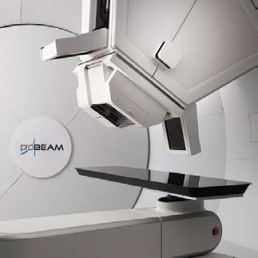por
Lauren Dubinsky, Senior Reporter | October 31, 2017

Varian's ProBeam
proton therapy system
Varian Medical Systems announced last Wednesday that Penn Medicine and Guangzhou Concord Cancer Hospital in China purchased its ProBeam proton therapy technology.
"These two announcements are the latest proof of the growing worldwide interest, adoption and availability of proton therapy," Dr. Moataz Karmalawy, general manager of Varian's particle therapy division, told HCB News.
Penn Medicine is installing the Varian ProBeam Compact single-room proton therapy system in a new cancer treatment center. The plan is to start construction in January and treat the first patient within two years.
It’s the only single room system on the market that performs fully rotational intensity modulated proton therapy, according to Varian. It’s composed of a cyclotron, the Dynamic Peak scanning technology for IMPT, fully rotational gantry and robotic patient positioning and motion management tools.
Penn Medicine also purchased Varian’s ARIA information management system and the Eclipse treatment planning system.
The health system also recently partnered with Varian to test and launch the Halcyon photon system.
Last month, one of its patients with head and neck cancer became the first in the world to be treated with that new system.
The new Guangzhou Concord Cancer Hospital plans to purchase a ProBeam four-room proton therapy system as well as the ARIA and Eclipse software and a 10-year service agreement. Construction began in February 2017 and the hospital is scheduled to be in operation by the end of 2019.
Once complete, it will be one of the most advanced oncology centers in Guangdong province. According to Varian, China continues to be a growth region for proton therapy and the company has invested in resources and infrastructure to ensure patients in the country have access to it.
Building a proton center in China is not much different from building one in other parts of the world such as India, the Middle East and Russia, according to Moataz. Like most countries, China has specific government regulations and licensing that's required to build and install this equipment.
"China does have a thriving construction industry, so finding a qualified builder is not a significant hurdle," said Moataz. "Varian is also fortunate to have a very large organization in China of more than 400 employees helping us navigate any issues that may arise in the construction and installation process."
The Asia proton therapy market is expected to increase three-fold from 2016 to 2022, according to a report published by Market Research Report in July. Although Japan is leading the market, China has a huge market opportunity due to its large population.
Back to HCB News
